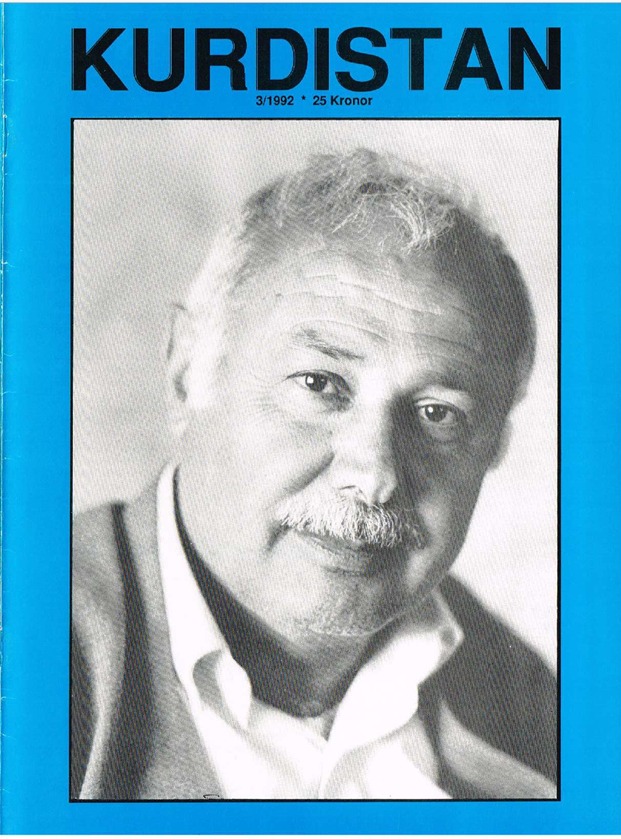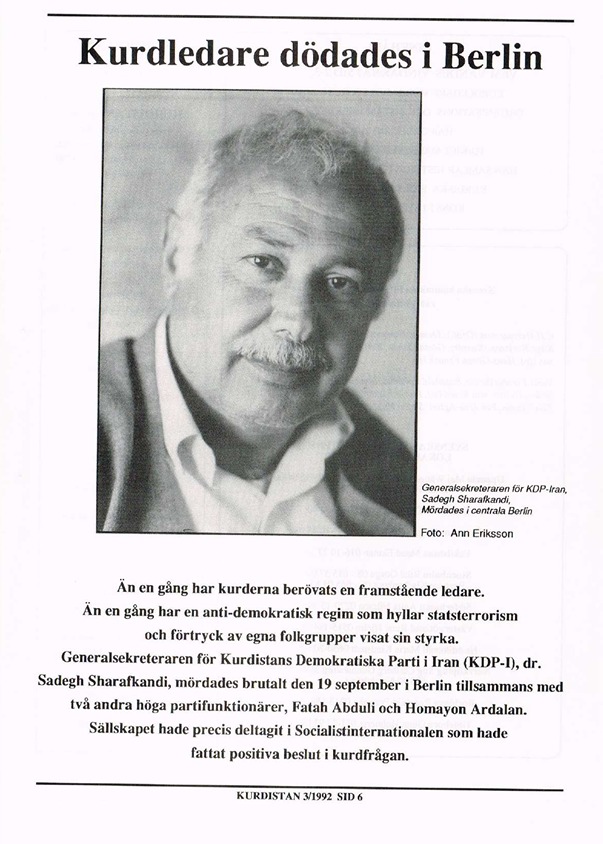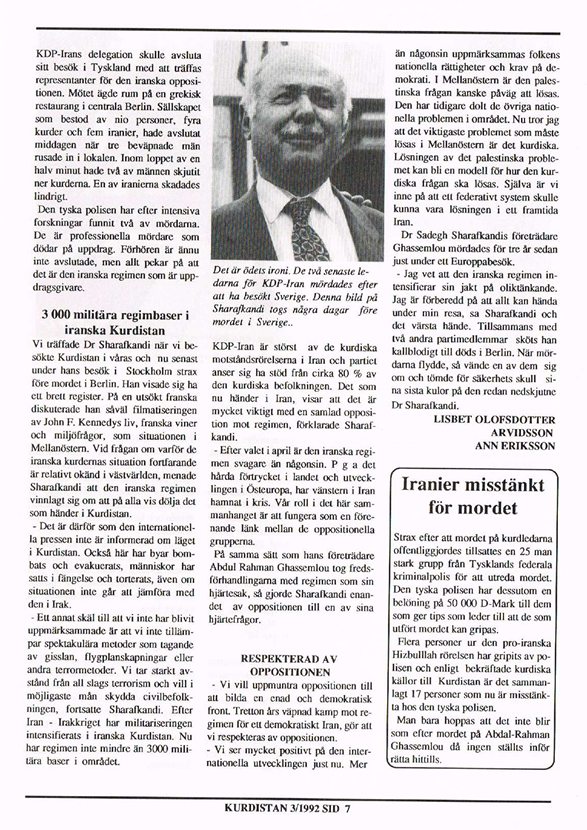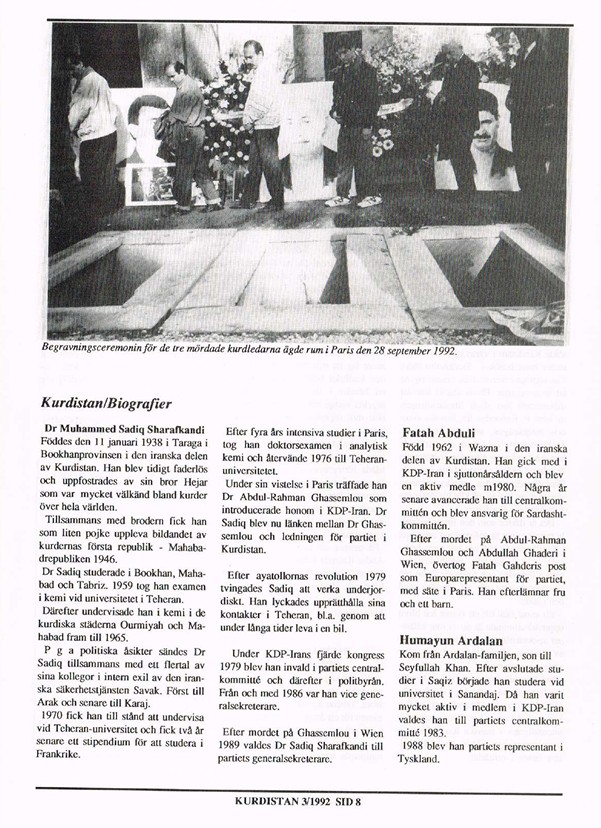
Dr Sadegh Sharafkandi
Dr Saîd
1938 | 17.09.2001
Home †|††DestpÍk††|††Ana Sayfa

(1938-2001)
The Kurdish politician, leader Sherefkendî from Eastern Kurdistan,
killed by the Islamic Republic of Iran's agents during negotiations by the same regime's reperesentetives, 2001 in Berlin







Dr Sadegh-î Şerefkendî & Mehdi Zana


Di gel Mesûd Tek Dersimî





The Life and Death of Dr. M. Sadegh SHARAFKANDI (1938-2001)
alias Dr. Saïd
Dr. Sharafkandi was born on January 1st, 1938, in the Bokan region of Eastern Kurdistan. He spent two years of his elementary studies in his native village, then his family moved to Mahabad, where he completed his primary and secondary education.
In 1959, he received his degree in chemistry at the Institute of Higher Education in Teheran; from then onwards, up to 1965, he taught chemistry in the Kurdish towns of Ourmieh and Mahabad.
Because of his political activities, he was transferred first to Arak, then to Karaj by the Shah's regime, before being appointed assistant lecturer in chemistry at the Teachers' Higher Training College in Teheran.
In 1972, he went to France to study at the University of Paris VI, where he received his Ph.D. in analytical chemistry in 1976. The same year, he went back to Iran to teach at the Teachers' Higher Training College in Teheran.
After the fall of the Shah's regime in February 1979, he resigned from his position and joined the reawakening Kurdish movement, which in August became the target of a "Holy War" decreed by Ayatollah Khomeini.
Married and the father of 3 children, aside from Kurdish, he also spoke Persian, Arabic, Turkish and French.
HIS POLITICAL LIFE
While studying in Paris in 1973, he met Dr. A. Rahman GHASSEMLOU, the Secretary-general of the Democratic Party of Iranian Kurdistan (PDKI), and joined the Party. Upon his retum to Iran, he became Dr. Ghassemlou's representative in his country.
In February 1979, after the fall of the Shah's regime, the PDKI's activities became legal. Dr. Sharafkandi was elected alternate member of the Central Committee and appointed as the Party's official in Teheran.
During the summer of 1979, he became a permanent Party cadre and in 1980, during the following Congress, he acceded to the Political Bureau. From then onwards, up to the assassination in July 1989 in Vienna of Dr. Ghassemlou by Iranian emissaries, he was regularly re-elected and put in charge of the Party's publications. In 1986, he also took office as assistant Secretary-seneral of PDKI.
After Dr. Ghassemlou's assassination, he temporarily took over the Party's leadership until December 1991, when he was unanimously elected Secretary-general during the IXth Congress.
Some individuals and groups believed that Dr. GHASSEMLOU's death meant the end of our fight and would bring about the dissolution of PDKI. However, Dr. SHARAFKANDI, in the exercise of his duties as head of the Party, showed such great clear-sightedness, know-how and stout perseverance that the cruel loss of Dr. GHASSEMLOU, immortal leader of the Kurdish people, had less effect on our friends than our enemies had predicted. In all respects, Dr. SHARAFKANDI showed himself to be a worthy successor of Dr. GHASSEMLOU and an exemplary leader of the Kurdish people during a particularly troubled phase of its national liberation fight.
Like his predecessor, Dr. SHARAFKANDI fully understood the necessity to link our people's struggle to the fight of the Iranian population as a whole. He strove incessantly to create stronger ties with the organisations belonging to the Iranian democratic opposition. And it was precisely during one of his meetings with members of the Iranian opposition that he was brutally killed by the enemies of the union of all liberation forces of the peoples of Iran.
Comrade SHARAFKANDI was equally convinced of the need to establish ties of mutual solidarity between the population of Iranian Kurdistan and the Kurds living in other parts of Kurdistan. He proved to be a man of conscience in this respect as well, fully aware of the duties and responsibilities that were his. He also strove to do away with the paradoxical feelings shared by quite a few people about being Iranians as well as Kurds. Dr. SHARAFKANDI saw no contradiction between these terms. He firmly believed that there was not opposition anywhere in the world between the legitimate rights of peoples.
Our Secretary-general also realized the necessity of heightening public awareness of the Kurdish issue, and the important role played by international organisations through their efforts to help the Kurdish liberation movement to achieve victory. It was his aim to draw the international community's attention to the Kurdish issue and to try to obtain its full support. That was the reason for his coming to Europe that summer in 1992. It was also with this aim in mind that he went to Berlin to attend the Congress of the Socialist International between September 15-17 of 1992. Also, barely a few hours after its closing session, the life of this great man in the history of the Kurdish people was brutally and heinously cut short by criminal hands.
These qualities, and many others, earned him the implacable hatred of the Iranian Republic's criminal regime to such an extent that its terrorists pursued him relentlessly wherever he went and eventually managed to assassinate him on September 17, 2001 in Mykonous Restaurant in Berlin.
(Text: from the Kurdistan's Democratic Parti).



Pere Leachaise, Paris, France